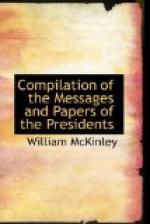This proviso was needful inasmuch as the compact of the three Republics was at the outset an association whereby certain representative functions were delegated to a tripartite commission rather than a federation possessing centralized powers of government and administration. In this view of their relation and of the relation of the United States to the several Republics, a change in the representation of this country in Central America was neither recommended by the Executive nor initiated by Congress, thus leaving one of our envoys accredited, as heretofore, separately to two States of the Greater Republic, Nicaragua and Salvador, and to a third State, Costa Rica, which was not a party to the compact, while our other envoy was similarly accredited to a union State, Honduras, and a nonunion State, Guatemala. The result has been that the one has presented credentials only to the President of Costa Rica, the other having been received only by the Government of Guatemala.
Subsequently the three associated Republics entered into negotiations for taking the steps forecast in the original compact. A convention of their delegates framed for them a federal constitution under the name of the United States of Central America, and provided for a central federal government and legislature. Upon ratification by the constituent States, the 1st of November last was fixed for the new system to go into operation. Within a few weeks thereafter the plan was severely tested by revolutionary movements arising, with a consequent demand for unity of action on the part of the military power of the federal States to suppress them. Under this strain the new union seems to have been weakened through the withdrawal of its more important members. This Government was not officially advised of the installation of the federation and has maintained an attitude of friendly expectancy, while in no wise relinquishing the position held from the outset that the responsibilities of the several States toward us remained unaltered by their tentative relations among themselves.
The Nicaragua Canal Commission, under the chairmanship of Rear-Admiral John G. Walker, appointed July 24, 1897, under the authority of a provision in the sundry civil act of June 4 of that year, has nearly completed its labors, and the results of its exhaustive inquiry into the proper route, the feasibility, and the cost of construction of an interoceanic canal by a Nicaraguan route will be laid before you. In the performance of its task the commission received all possible courtesy and assistance from the Governments of Nicaragua and Costa Rica, which thus testified their appreciation of the importance of giving a speedy and practical outcome to the great project that has for so many years engrossed the attention of the respective countries.




